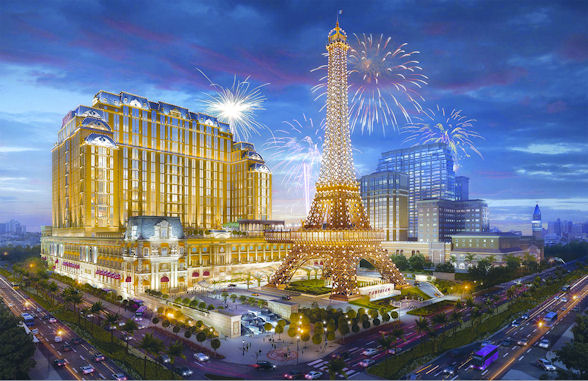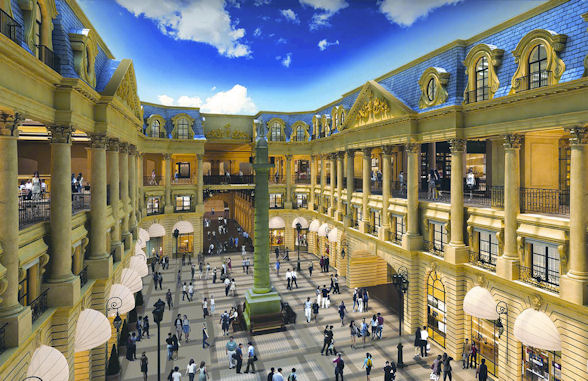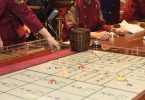This article first appeared in the Jul/Aug 2016 issue of WGM.
After two years of declining revenues for the once unstoppable Macau gaming industry, analysts have tipped the openings of Wynn Palace and The Parisian later this year will be the catalyst for recovery.

A decade after leading the extraordinary boom that transformed Macau into a global gaming behemoth, casino magnates Steve Wynn and Sheldon Adelson could soon play the role of saviors when their latest Macau resorts – Wynn Palace and The Parisian – open their doors in late 2016.
So says CLSA’s top gaming industry analyst, Aaron Fischer, who has tipped Macau’s flagging fortunes to finally turn around next year thanks specifically to the unique appeal of Wynn and Adelson’s new properties.
![[b]Will Steve Wynn's new Cotai property trigger a resurgence for the Macau gaming industry?[/b]](http://www.wgm8.com/wp-content/uploads/2016/06/images_wgm_1042_parisian-and-wynn-2.jpg)
“We have very high hopes for Wynn Palace and The Parisian,” Fischer told WGM, expressing rare optimism at a time when Macau has just clocked its 24th consecutive month of declining year-on-year gross gaming revenue (GGR).
“Wynn Palace is a US$4.1 billion investment and it’s going to be the nicest property in Macau. Steve Wynn has done a great job over time of building luxury properties that appeal to people.
“Then you’ve got The Parisian which will have its replica Eiffel Tower and lots of hotel rooms – we believe these two properties combined will help increase visitation.”
Wynn Palace and The Parisian are among eight new integrated resorts to have broken ground in Macau’s specially-designated tourism and entertainment area of Cotai back when the city was riding a wave of massive growth.
In the 10 years between 2004 and 2013, GGR exploded from MOP$41.6 billion (US$5.2 billion) to MOP$360.7 billion (US$45 billion) including a phenomenal 19 percent increase from 2012 to 2013.
![[b]The Parisian pool deck[/b]](http://www.wgm8.com/wp-content/uploads/2016/06/images_wgm_1042_parisian-and-wynn-3.jpg)
But from its peak month in February 2014, Macau’s GGR has plummeted by half on the back of Chinese President Xi Jinping’s crackdown on corruption which ultimately decimated the flow of cashed-up VIP players from the mainland.
Not surprisingly, Macau’s casino operators have been a little nervous about their Cotai investments in the two years since, their fears only heightened when the first of the new properties – Galaxy Phase II, Broadway Macau and Studio City – failed to make any significant impact on revenues after opening last year.
It makes for a vitally important few months ahead, with MGM Cotai and Stephen Hung’s uber-luxurious The 13 also due for launch before year’s end, but Fischer insists Wynn Palace and The Parisian were always going to be the openings that mattered.
“The fact that [the 2015 openings] didn’t grow the market is a little bit concerning, but we argue the reason they didn’t grow the market was project specific,” he explains.
“For example, Galaxy Phase II was an extension of an existing property rather than a new free standing property – it really just complemented what was already there. And although Studio City is a great looking property, it faces big challenges around its ownership structure and location.
![[b]An artist's impression of the Rotunda at The Parisian[/b]](http://www.wgm8.com/wp-content/uploads/2016/06/images_wgm_1042_parisian-and-wynn-4.jpg)
“That’s not the case with the coming properties.”
Fischer isn’t alone in his optimism. Asked his thoughts on what sort of impact the four resorts opening in late 2016 might have, Union Gaming Managing Director Grant Govertsen also pointed to Wynn Palace and The Parisian as the ones to watch.
“We remain bullish on The Parisian given its French theme,” Govertsen agreed. “While themed resorts are passé as it relates to Vegas, they still work here. Given the affinity for all things French on the part of mainland Chinese, we think The Parisian will be a very successful property and likely the most heavily foot trafficked property in Macau, making the combined Venetian-Parisian the foot traffic kings. The addition of things like the Eiffel Tower should draw incremental visitors to the market too.
“As for Wynn Palace, it will set a new standard for luxurious mega-resorts. In our view it is almost like a “best of” project by Mr Wynn. Given the likely “flight to quality” we think Wynn Palace has a shot at reenergizing customers to either come back to Macau or perhaps increase their frequency of visitation.”

So what does this mean in dollar terms? For starters, it signals an end to declining revenues.
According to CLSA’s estimates, Macau’s annual GGR will finally bottom out in 2016 at around US$28 billion – its lowest mark since 2010 – having fallen from a high of US$45 billion in 2013 to US$44 billion in 2014 and US$29 billion last year.
And although the explosiveness of Macau’s glory days are a thing of the past, CLSA anticipates GGR will grow by around US$10 billion to US$38 billion by 2020 – bringing it back to 2012 levels.
This all flies in the face of the largely pessimistic outlook sprouted by many of Macau’s concessionaires, particularly in regard to the government’s push for greater diversification of non-gaming offerings.
Melco-Crown CEO Lawrence Ho famously quipped last year that, “the cold hard truth is, non-gaming doesn’t make any money and it will never make any money. For all the foolish people out there that think non-gaming is going to save the day, it’s not.”
To the contrary, Fischer believes the coming years actually provide Macau with a unique opportunity.
“We’re very bullish on Chinese tourism and Asian tourism – that’s one of the key drivers of people going to resorts,” he said.
“Of course you’ve got your hard core gamblers that want to come to Macau but there are a huge number of people that are happy to come and have a broader holiday experience which involves shopping, F&B, entertainment and gambling.
![[b]Sands Chairman Sheldon Adelson continues to heavily influence the Macau gaming industry[/b]](http://www.wgm8.com/wp-content/uploads/2016/06/images_wgm_1042_parisian-and-wynn-6.jpg)
“We see strong demand for the integrated resort experience and that’s driven by things like the expanding middle class in Asia. Even though China is slowing down in terms of the growth rate and there are some other concerns about some Southeast Asian countries, the middle class will be expanding over the next 10 years. It’s not going to contract.
“Also, if you take a broader view and look around Asia, there are very few countries that have legalized casinos in a meaningful way. You’ve got Macau, Singapore, the Philippines and Australia and that’s about it.
“So we certainly have an optimistic view from a revenue outlook but also from a returns perspective because we don’t think we are in a situation where we have over-supply yet in Asian gaming like we do in the US where there are close to 1,000 casinos.”
The suggestion that Macau’s upcoming resort openings will trigger some upward movement stems from a belief that new opportunities are waiting.
Take The 13 for example. Billed as the most luxurious hotel in the world with rooms costing up to US$100,000 a night, many have questioned where its clientele will now come from given Macau’s dwindling VIP customer base. Fischer, on the other hand, believes the global publicity its sheer extravagance will attract upon opening could lure non-Chinese, ultra-rich tourists from previously untapped markets such as the Middle East and Europe.
Yet the most telling factor for Macau’s immediate future, according to Union Gaming’s Govertsen, will be the desperately needed increase in the number of hotel rooms across the city from around 30,000 now to 38,000 by the end of this year and 46,000 by 2018.
![[b]Macau's existing properties, including Melco-Crown's City of Dreams, could benefit from the upcoming resort openings[/b]](http://www.wgm8.com/wp-content/uploads/2016/06/images_wgm_1042_parisian-and-wynn-7.jpg)
“An often overlooked fact is that of the ‘Big 6’ casino operators, most have historically not had strong mass market marketing programs into mainland China,” Govertsen explained.
“The reality is that if one of the smaller casino operators with only a limited number of hotel rooms – say MGM or Wynn – had previously marketed to non-premium mass market visitors from some more distant province like Hubei, this customer would probably have had to stay at a Sands property because Sands was historically the only operator with a sufficient number of hotel rooms.
“As such, we don’t think the other operators had much incentive to really try and penetrate deep into mainland China as it relates to the lower tiers of mass market.
“This is good news as when we think about the next few years, all of the ‘Big 6’ will finally have a sufficient complement of hotel rooms that allows them to truly go after customers deeper into China. Over time, these persons will come to the market and contribute to the nascent mass market growth story we are already seeing.”







